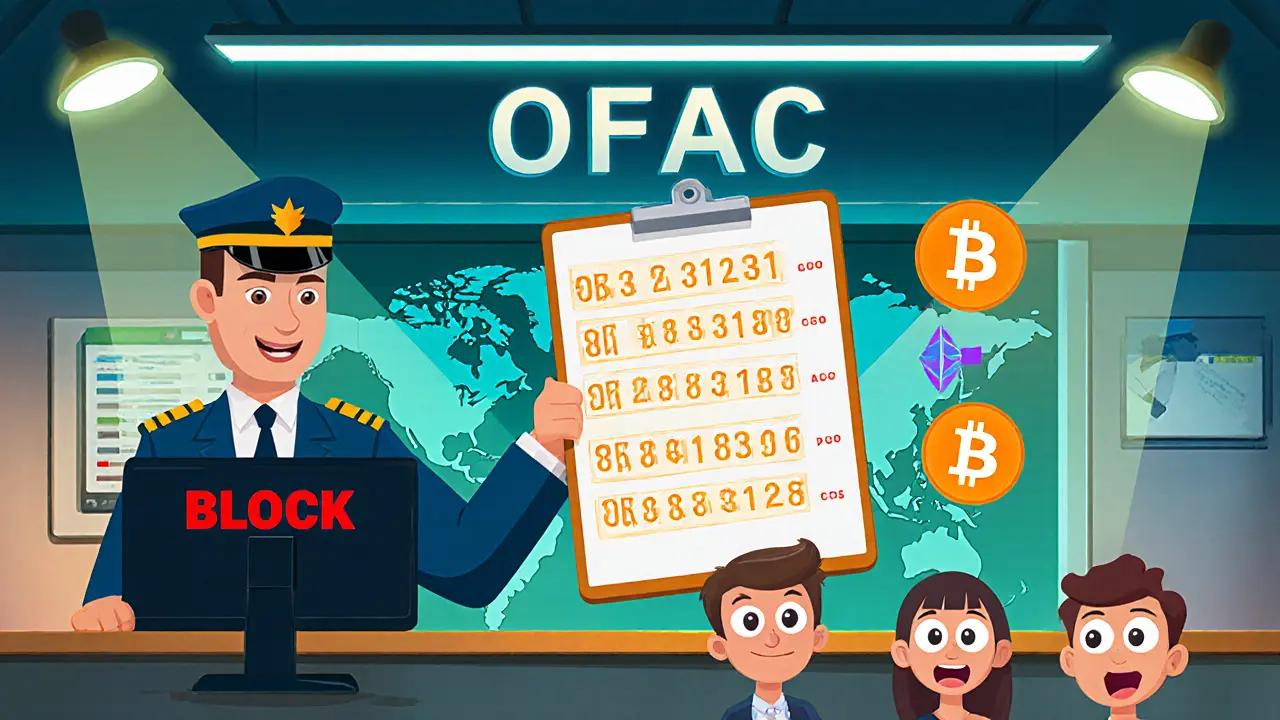OFAC Wallet Address Checker
Check Sanctioned Addresses
Enter a cryptocurrency wallet address to verify if it's on the OFAC sanctions list. This tool checks addresses from the article's examples including Ethereum, Tron, and Bitcoin networks.
Known Sanctioned Addresses
Key Takeaways
- OFAC has published specific wallet addresses, forcing exchanges to block Iranian crypto transactions.
- Major platforms like ShapeShift faced multi‑hundred‑thousand‑dollar settlements for sanction breaches.
- Evasion has shifted to privacy coins, decentralized exchanges, and successor platforms such as Grinex.
- Compliance now requires real‑time address screening, AI‑driven transaction monitoring, and geo‑blocking.
- Future enforcement will lean heavily on blockchain analytics and machine‑learning pattern detection.
Since the U.S. Treasury began targeting digital‑asset abuse in 2015, the OFAC sanctions on Iranian cryptocurrency are a series of legal measures that block Iranian actors from using global crypto exchanges. For anyone watching the crypto‑compliance space, the question is simple: how far will these sanctions reach, and what does that mean for Iranian users trying to trade on mainstream platforms?
What is OFAC and Why It Matters for Crypto
The Office of Foreign Assets Control (OFAC) is the Treasury bureau responsible for administering and enforcing economic and trade sanctions. In April 2015 OFAC added a cyber‑related sanctions program, giving it the authority to target individuals who facilitate illicit digital‑currency flows. This move was a direct response to ransomware payouts, illicit oil financing, and other activities that used the anonymity of blockchain to skirt traditional banking checks.
Milestones in the Sanctions Timeline
Three key actions illustrate how the program has evolved:
- November 28 2018 - SamSam ransomware addresses: OFAC named two Iranian facilitators and, for the first time, published their Bitcoin wallet IDs. This public list let exchanges automatically flag and freeze incoming ransom payments.
- September 2025 - $600 million shadow‑banking network: A sprawling scheme that moved over $100 million of oil revenue through crypto was dismantled. The Treasury released five wallet addresses (two on Ethereum, three on Tron) linked to the network.
- March 2025 - Grinex successor exchange: After the secret service shut down Garantex, the same operators launched Grinex, openly advertising that it existed to “serve sanctioned customers.”
Each step showed a new layer of technical capability, from static address lists to real‑time monitoring of multi‑chain activity.
How OFAC Publishes Wallet Addresses
OFAC now maintains a publicly searchable SDN (Specially Designated Nationals) list that includes crypto addresses. For example, the September 2025 designation of Arash Estaki Alivand is the individual whose five addresses-two Ethereum and three Tron-were added to the sanctions list. The addresses are:
- Ethereum: 0xe3d35f68383732649669aa990832e017340dbca5
- Ethereum: 0x532b77b33a040587e9fd1800088225f99b8b0e8a
- Tron: TYDUutYN4YLKUPeT7TG27Yyqw6kNVLq9QZ
- Tron: TRakpsE1mZjCUMNPyozR4BW2ZtJsF7ZWFN
- Tron: TQ5H49Wz3K57zNHmuXVp6uLzFwitxviABs
Exchanges can pull this list via API, compare every incoming address, and automatically block transfers that match. The result: a permanent digital fingerprint that stops sanctioned funds at the network layer.

Impact on Major Crypto Exchanges
When an exchange fails to screen these addresses, the penalties are steep. The case of ShapeShift is a former U.S. exchange that settled for $750,000 over two years of sanction violations demonstrates the risk. ShapeShift processed roughly $12.6 million worth of crypto for users in Iran, Cuba, Sudan, and Syria before the settlement forced a complete overhaul of its compliance program.
Other platforms have taken preventative steps:
- Geo‑blocking IP ranges that originate from Iran.
- Real‑time address screening against the OFAC SDN list.
- Enhanced KYC/AML checks for any user attempting to withdraw to an Iranian bank account.
These measures have pushed Iranian traders toward decentralized finance (DeFi) protocols, peer‑to‑peer marketplaces, and privacy‑centric coins such as Monero is a privacy‑focused cryptocurrency that obscures sender, receiver, and transaction amount.
Case Study: ShapeShift Settlement
ShapeShift’s $750,000 settlement in September 2025 was a watershed moment. The exchange had allowed over 20,000 daily transactions across 79 digital assets, but it lacked a systematic way to flag sanctioned wallets. The Treasury’s investigation revealed that the platform’s “risk‑based” approach was too lax, resulting in permitted trades that directly funded Iranian entities.
Post‑settlement, ShapeShift introduced a three‑tier compliance stack:
- Automated address matching (using the OFAC SDN API).
- Manual review of high‑value transfers (> $10,000).
- Periodic audits by external blockchain‑analytics firms.
Within six months, the platform reported a 99% drop in flagged transactions and has since become a reference point for other exchanges looking to avoid similar penalties.
Case Study: Grinex - The Sanction‑Evasion Playbook
When the U.S. Secret Service shut down Garantex in March 2025, the operators instantly launched Grinex exchange is a successor platform created expressly to serve customers blocked by sanctions. Their marketing slogan read “Your crypto, your freedom,” and the site openly advertised “no KYC, no borders.”
Grinex’s model relies on three tricks:
- Using the A7A5 token, a ruble‑backed asset issued by a Kyrgyzstani firm, to move value without touching USD.
- Routing trades through offshore liquidity providers in the UAE and Hong Kong, which sit outside direct U.S. jurisdiction.
- Encouraging users to swap into privacy coins (Monero, Zcash) before withdrawing, effectively erasing the transaction trail.
By early 2025, Grinex facilitated billions of dollars in crypto trades, proving that sanctions can be sidestepped when regulators rely solely on centralized exchange data.

Evasion Tactics Beyond Centralized Exchanges
Iranian actors now favor a mix of methods:
- Decentralized exchanges (DEXs): Platforms like Uniswap run on smart contracts, offering no KYC and making it hard for OFAC to block specific wallets.
- Privacy‑focused cryptocurrencies: Monero, ZCash, and newer protocols such as Bitcoin Private is a fork that combines Bitcoin’s security with privacy features hide transaction details, thwarting address‑based screening.
- Peer‑to‑peer networks: Telegram groups, local “OTC” desks, and informal meet‑ups let users swap fiat for crypto without ever touching an exchange.
These channels raise the compliance cost for any platform that wants to stay on the right side of the law.
Future Outlook: AI, Analytics, and New Challenges
Blockchain analytics firms are now turning to machine‑learning models that flag irregular patterns-rapid address hopping, mixing privacy coin bridges, and repeated sub‑$5,000 transfers that aggregate into large sums. The Treasury’s own Office of Intelligence and Analysis (OIA) is testing a system that cross‑references shipping manifests, oil export data, and crypto transaction graphs to pinpoint hidden sanction evasion.
At the same time, the rise of artificial intelligence in sanctions compliance is a growing field where algorithms score the risk of each blockchain address in real time means platforms can react within seconds instead of days. However, privacy‑coin developers are already working on zero‑knowledge proofs that could hide precisely the data AI needs, setting up a cat‑and‑mouse game that will likely intensify over the next few years.
Practical Checklist for Exchanges
If you run a crypto platform, here’s a short action list to stay compliant with OFAC sanctions:
- Integrate the official OFAC SDN API and update it at least hourly.
- Screen every incoming and outgoing address on all supported blockchains (Bitcoin, Ethereum, Tron, etc.).
- Implement geo‑blocking for IPs originating from Iran, Syria, Cuba, Sudan, and North Korea.
- Deploy an AI‑driven transaction monitoring system that flags rapid address changes or hub‑and‑spoke patterns.
- Partner with a reputable blockchain‑analytics provider for periodic deep‑dive audits.
- Maintain a documented sanctions‑compliance policy and train staff quarterly.
Following these steps will dramatically reduce the chance of a costly enforcement action and keep your platform attractive to legitimate traders.
Quick FAQ
What exactly does OFAC sanction when it comes to crypto?
OFAC can designate individuals, companies, and even specific wallet addresses. Once listed, any U.S. person or entity must block transactions involving those addresses, and foreign platforms that serve U.S. customers are expected to do the same.
Can an exchange ignore the OFAC list if it only serves non‑U.S. users?
Legally, non‑U.S. platforms are not bound by U.S. law, but most choose to comply because they rely on U.S. banking partners, liquidity providers, or want to avoid secondary sanctions.
How effective are privacy coins at evading sanctions?
Privacy coins hide sender, receiver, and amount, making address‑based screening impossible. However, exchanges that list them are increasingly scrutinized, and many jurisdictions are moving to ban or heavily regulate such assets.
What role do blockchain analytics firms play?
They map transaction flows, identify clusters of addresses linked to sanctioned entities, and provide alerts that help exchanges stay ahead of OFAC updates.
Will AI eventually replace human compliance teams?
AI can handle large‑scale monitoring and flag anomalies, but human judgment is still needed for legal interpretation, risk assessment, and handling false positives.

Jenna Em
October 21, 2025 AT 08:41It feels like every new rule is just a chess move in a bigger game. We keep hearing about OFAC blocking wallets, but who’s really pulling the strings? Maybe it’s just the usual power play to keep us in the dark. The list of addresses looks like a grocery list, yet the real impact disappears into the shadows. At the end of the day, we’re left guessing who benefits.
Stephen Rees
October 22, 2025 AT 10:31When you think about it, the timing of each sanction line‑up with major market spikes. It’s almost as if someone wants to steer capital away from certain regions. The fact that the list is public makes it look transparent, but the real filters are hidden deep in the code. I just watch and wonder what’s really being filtered.
Katheline Coleman
October 23, 2025 AT 12:21Thank you for the comprehensive overview. The delineation of compliance steps is particularly useful for operators seeking to align with OFAC requirements. I would like to add that continuous staff training is indispensable, as regulatory expectations evolve rapidly. Moreover, integrating multi‑chain analytics can further mitigate inadvertent violations. Your checklist serves as an excellent foundational guide.
Amy Kember
October 24, 2025 AT 14:11Spot on. Real‑time screening is a must. No excuses for lagging behind.
Evan Holmes
October 25, 2025 AT 16:01Another money grab by the government.
Isabelle Filion
October 26, 2025 AT 16:51Indeed, the government’s benevolent “protective” measures never fail to uplift market confidence, do they? A simple address list that magically resolves all illicit activity is a stroke of genius. One can only admire the effortless brilliance of such regulation.
john price
October 27, 2025 AT 18:41Honestly this is just a smudge on the whole system! They cant keep pulling the rug out from under us foor every new compliance rule. If they think we wont find a way arounnd it, theyre sorely wrong. This whole "block chain" narrative is a joke and the enforcement is just lame.
Scott McCalman
October 28, 2025 AT 20:31Wow, look at that! The drama never ends 😂. Every time they announce a new sanction, the market does a little death‑and‑rebirth dance. It’s like watching a soap opera, but with more charts and less popcorn. Seriously though, the stakes are getting higher every day.
Jessica Pence
October 29, 2025 AT 22:21Hey folks, just wanted to chime in with a quick tip. When integrating the OFAC SDN API, make sure you cache the results locally for at least an hour – it saves a ton of request overhead. Also, double‑check that your address normalisation handles both checksum and non‑checksum formats, otherwise you’ll get false negatives. One more thing – don’t forget to log every match; it makes audit trails a breeze. Hope that helps!
johnny garcia
October 31, 2025 AT 00:11Excellent points, Jessica. Implementing a robust logging framework not only satisfies auditors but also empowers internal risk teams to act swiftly 🚀. I would also recommend periodic stress‑testing of the screening pipeline under peak transaction loads to ensure no bottlenecks emerge. Consistency in enforcement is key, and a well‑documented policy reinforces that consistency 📚.
Andrew Smith
November 1, 2025 AT 02:01Great discussion everyone! The road might seem bumpy, but every hurdle is a chance to upgrade our defenses. Let’s keep sharing best practices and push the industry toward smarter compliance. Together we can turn these challenges into opportunities for innovation.
Mike GLENN
November 2, 2025 AT 03:51While the OFAC measures appear decisive on the surface, their long‑term efficacy warrants deeper scrutiny. The immediate effect-blocking listed wallets-does provide a veneer of control, yet sanctioned actors quickly adapt by migrating to privacy‑enhanced protocols. Each time a new address is added, a cat‑and‑mouse game ensues, with developers engineering workarounds that bypass static lists. Decentralized exchanges, by design, lack a central authority capable of enforcing such bans, allowing funds to flow unimpeded. Moreover, the rise of zero‑knowledge proofs promises to obfuscate transaction metadata, rendering even the most sophisticated analytics blind. In this evolving landscape, reliance on manual address surveillance becomes increasingly untenable. Machine‑learning models can detect anomalous patterns, but they also require vast, high‑quality datasets that regulators often cannot access due to jurisdictional constraints. The integration of blockchain analytics firms has improved visibility, yet their tools are not infallible and can generate false positives that hinder legitimate users. Additionally, the geopolitical ramifications of heavy‑handed sanctions risk alienating emerging markets, potentially driving them toward alternative, less regulated financial ecosystems. This could inadvertently strengthen the very networks that sanctions aim to dismantle. Therefore, a balanced approach that couples technical enforcement with diplomatic engagement may yield more sustainable outcomes. Stakeholders should also consider transparent appeals processes for users inadvertently caught in compliance nets, fostering trust in the regulatory framework. Education initiatives targeting developers can further reduce inadvertent facilitation of sanctioned transactions. Finally, continuous feedback loops between regulators, analytics providers, and the crypto community are essential to adapt policies in real time. Only through such collaborative vigilance can the objectives of sanctions be met without stifling legitimate innovation.
BRIAN NDUNG'U
November 3, 2025 AT 05:41Indeed, Mike’s comprehensive analysis underscores the complexity of enforcing sanctions in a decentralized world. While the challenges are formidable, a measured and collaborative approach, as you suggest, appears to be the most pragmatic path forward.